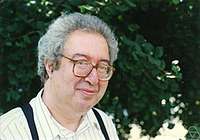Robert M. Solovay
Robert Martin Solovay (born December 15, 1938) is an American mathematician specializing in set theory.
Robert M. Solovay | |
|---|---|
 Robert Solovay in 1983 (photo by George Bergman) | |
| Born | December 15, 1938 Brooklyn, New York, U.S. |
| Nationality | American |
| Alma mater | University of Chicago |
| Awards | Paris Kanellakis Award (2003) |
| Scientific career | |
| Fields | Mathematics |
| Institutions | University of California, Berkeley |
| Doctoral advisor | Saunders Mac Lane |
| Doctoral students | Matthew Foreman Judith Roitman W. Hugh Woodin |
Biography
Solovay earned his Ph.D. from the University of Chicago in 1964 under the direction of Saunders Mac Lane, with a dissertation on A Functorial Form of the Differentiable Riemann–Roch theorem.[1] Solovay has spent his career at the University of California at Berkeley, where his Ph.D. students include W. Hugh Woodin and Matthew Foreman.[2]
Work
Solovay's theorems include:
- Solovay's theorem showing that, if one assumes the existence of an inaccessible cardinal, then the statement "every set of real numbers is Lebesgue measurable" is consistent with ZF without the axiom of choice;
- Isolating the notion of 0#;
- Proving that the existence of a real-valued measurable cardinal is equiconsistent with the existence of a measurable cardinal;
- Proving that if is a strong limit singular cardinal, greater than a strongly compact cardinal then holds;
- Proving that if is an uncountable regular cardinal, and is a stationary set, then can be decomposed into the union of disjoint stationary sets;
- With Stanley Tennenbaum, developing the method of iterated forcing and showing the consistency of Suslin's hypothesis.
- With Donald A. Martin, showed the consistency of Martin's Axiom with arbitrarily large cardinality of the continuum.
- Outside of set theory, developing (with Volker Strassen) the Solovay–Strassen primality test, used to identify large natural numbers that are prime with high probability. This method has had implications for cryptography.
- With T. P. Baker, J. Gill, proved that relativizing arguments cannot prove .[3]
- Proving that GL (the normal modal logic which has the instances of the schema as additional axioms) completely axiomatizes the logic of the provability predicate of Peano Arithmetic.
- With Alexei Kitaev, proving that a finite set of quantum gates can efficiently approximate an arbitrary unitary operator on one qubit.
Selected publications
- Solovay, Robert M. (1970). "A model of set-theory in which every set of reals is Lebesgue measurable". Annals of Mathematics. Second Series. 92 (1): 1–56. doi:10.2307/1970696. JSTOR 1970696.
- Solovay, Robert M. (1967). "A nonconstructible Δ13 set of integers". Transactions of the American Mathematical Society. American Mathematical Society. 127 (1): 50–75. doi:10.2307/1994631. JSTOR 1994631.
- Solovay, Robert M. and Volker Strassen (1977). "A fast Monte-Carlo test for primality". SIAM Journal on Computing. 6 (1): 84–85. doi:10.1137/0206006.
gollark: To ensure our ancestors' traditions are respected, we will randomly dig them up and drag them to voting booths.
gollark: - If a foreign country's relations with our own are poor, it should be removed from all maps and not acknowledged by government policy.
gollark: - I think markets are a reasonably good resource allocation system, and to ensure liquidity would support requiring any property someone owns whatsoever to be put up for auction if someone requests it.
gollark: - I believe our country should construct its own god to reduce reliance on foreign imports, and maintain a stock of reality anchors to remove other gods if necessary.
gollark: - I think that consumption, possession, distribution and production of all drugs should be legal everywhere for everyone at all times.- I support an improved tax system, where everyone in the country is directly billed `country's yearly operating expenses / population` each year, to increase fairness.
See also
References
- Robert M. Solovay at the Mathematics Genealogy Project
- https://math.berkeley.edu/people/faculty/robert-m-solovay
- Emerson, T. (1994-10-10). "Relativizations of the P=?NP question over the reals (and other ordered rings)". Theoretical Computer Science. 133 (1): 15–22. doi:10.1016/0304-3975(94)00068-9. ISSN 0304-3975.
External links
- Robert M. Solovay at the Mathematics Genealogy Project
- Robert Solovay at DBLP Bibliography Server

This article is issued from Wikipedia. The text is licensed under Creative Commons - Attribution - Sharealike. Additional terms may apply for the media files.